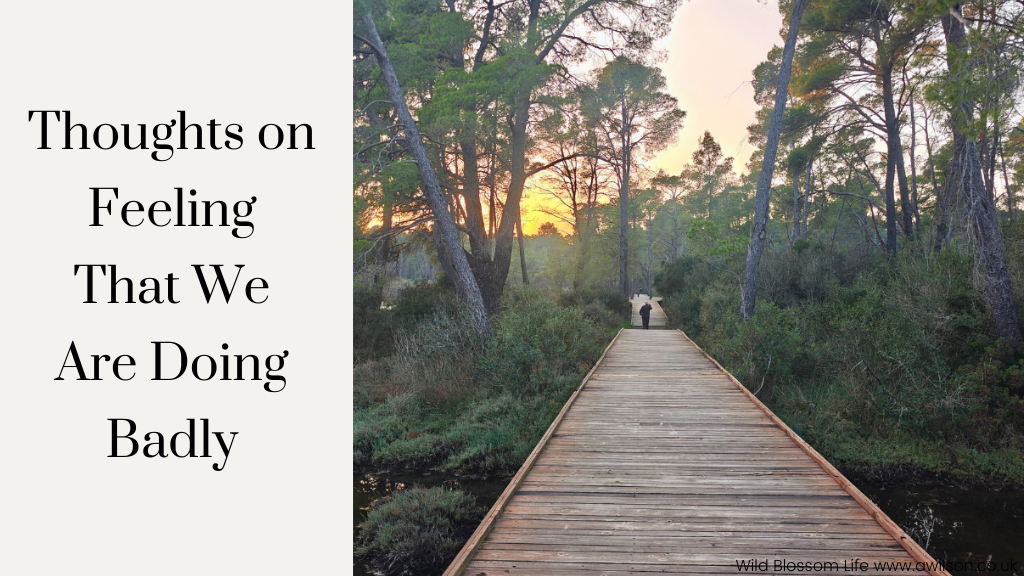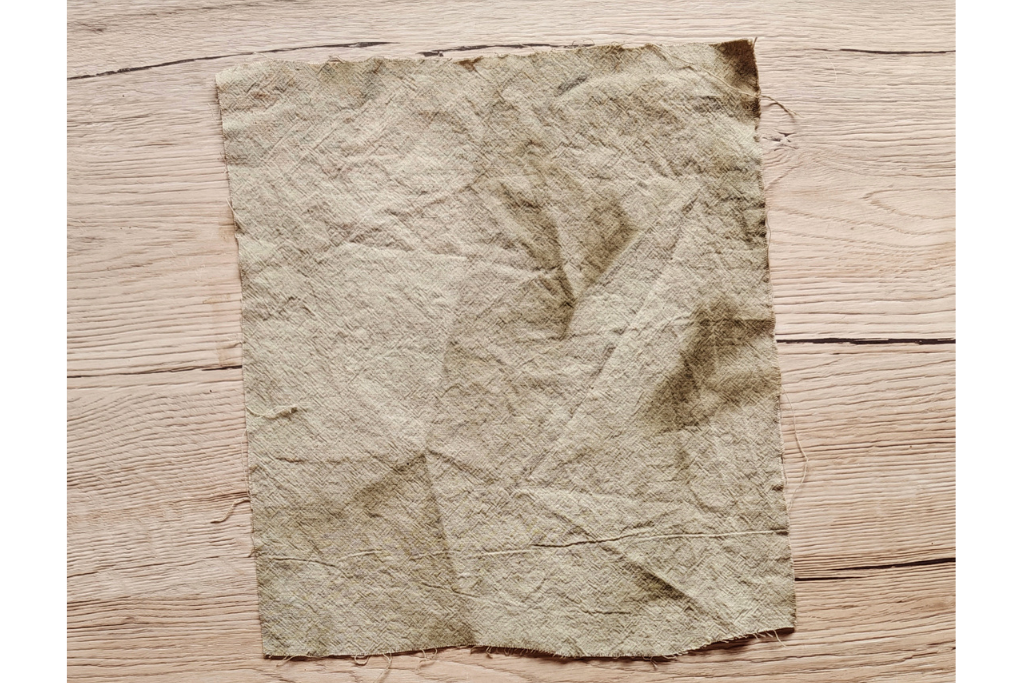
A little while ago, I was reading an email newsletter that mentioned a tv programme called Alone.
I’ve never seen Alone, but from the sound of things, it has a similar format to the Great British Bake Off. A group of people are deposited in the wilderness with only their wits, and perhaps a flint and steal or a length of paracord (I’ve no idea!), and each week somebody is evicted and sent home.
In this particular episode, the final 4 survivors were announced, and they included a woman named Elise.
When Elise found out that she was in the final four, instead of being overjoyed, she burst into tears. She kept saying,” But I thought I was doing so badly.”
The author of the email said it made her cry. She said that so often we are like Elise. too. We think we’re doing badly when all things considered, we are actually doing really well.
The email ended with encouragement to see that we are all doing better than we realise, even if we don’t see it.
I agreed with the email entirely. But it also got me thinking a bit more. Why do we think we’re doing badly? So often we beat ourselves for not doing well enough, when actually, we are doing a pretty good job.
Why Do We Think We Are Doing Badly?
Feeling that we are doing badly affects all areas of our lives. We worry that we are not doing a good enough job of bringing up our children. Our homes don’t look like the houses we see on the internet. Our bodies aren’t like the bodies we see in the media, and our homes aren’t always perfectly tidy and spotlessly clean. We try things, and make mistakes. We have mad hair, and wrinkles, but apparently, everybody else’s everything is perfect, and we’re failing to meet that standard, every single day.
But the images of perfection that we see online are not real, and they don’t tell the whole story. I recently showed my teenaged sons a picture from Instagram of somebody’s beautiful, immaculate kitchen, while saying something along the lines of,” Where’s the mess? How do they do it?”
My son Aidan, who is 17 now but was 16 at the time, said,” It’s probably over there, ‘and pointed to the side of my phone.” They’ve tidied up for the photo, and just pushed the mess out of the way!” I know he’s probably right, but it’s difficult because we don’t see the mess. What we are shown instead are perfectly curated, edited versions of perfection that are often not real, but are held up as what we should aspire to. And when we compare ourselves to them, we see ourselves as lacking.
Perfectionism in Creativity
Edited, curated perfection extends to creativity too.
Earlier in the autumn, I had another attempt at using natural dyes, this time for my textiles course. I wrote about it here.
One of the things that doing a textiles degree has given me is a real appreciation for the imperfect, whether it is a drawing or a piece of dyed fabric. Imperfect things are usually much more interesting.
The bits of fabric that I dyed with blackberries and with onion skins resulted in an even colour, but the nettles didn’t. On one piece of fabric in particular, there were some strange blotches.

As I wasn’t aiming for perfect, it didn’t matter. And more than that, it gave me something interesting to work with. But I did want to know what had caused the dark patches. So I googled, and it threw up a lot of results, but in each one the dyed fabric was perfectly even, with not a weird blotch in sight.
I don’t believe for a single minute that I’m the only person who has ended up with mysterious dark patches when dyeing with nettles. As I had read a little bit about how using metal salts can alter the colour, I suspect that they were caused by the fabric touching the pan, and the nettle dye reacting with the iron in the pan. But nowhere could I find results that were similar to mine.
So not only are we shown perfect images as though they are real life, people are very reluctant to show anything that isn’t perfect or that could be considered a mistake.
Mistakes and messes are inevitable, but it’s though they’re something to be ashamed of. We feel that we need to pretend that we don’t make mistakes or messes. All the perfect things we see online tell us that other people don’t make them. So when we do, we feel bad. Like poor Elise, we think we are not doing very well because we experience the normal, natural part of the learning process which is making mistakes, and finding that not everything works perfectly the first time.

Impossible Standards Set For Women in Particular
There’s another element of feeling that we are doing badly that I suspect affects women in particular. We’re presented with this idea of having it all: perfect children, a beautiful home and a perfect career.
But the truth is that nobody has it all. Whatever you do, there are going to be sacrifices. Saying yes to one thing inevitably means saying no to something else.
For women with school aged children, it is difficult to work even part time without support. Little children need an adult to keep an eye on them, and I actually don’t think it’s a good idea to leave secondary aged children on their own for hours and hours. They have needs too. Yet support is never mentioned. It’s as though we are expected to have perfect home lives and perfect careers without any help at all.
As well as being untrue, it shows a huge lack of respect for the (mostly) women who are taking care of other people’s children and cleaning other people’s houses. Child minding and cleaning are not known for being well paid jobs. Usually they are undertaken by women who want to fit a paying job in around their own families. And that’s without mentioning the grandparents who often do all of that for free.
Judgement From People Around Us
Social media and the internet in general has a lot to answer for. But unfortunately, there is often plenty of judgement from people around us. A quick look at the comments on things posted on the internet will often show how judgemental people can be, and it spills over into real life too.
I don’t share as much personal family stuff online as I used to, as a way of protecting my family’s privacy, but I do want to share this one thing from my own life.
My eldest son is now at university. He started there in September, and while it has obviously been a huge step for him, it’s a big change for me too.
I love being a mum, and while our children are supposed to grow up, and it’s been a joy and a privilege to see them evolve from babies to boys, and now into young men, it’s hard too.
As parents we worry, and as mums especially. We ask ourselves whether we have done enough, or whether we’ve done too much. We worry about whether they will be able to operate the washing machine, cook for themselves and manage to eat a balanced diet and not get scurvy. We worry that they’re going to be homesick, or that something will happen and we’ll be too far away to help.
I know that mums all over the world worry about their babies fledging, but it doesn’t make it any easier. And one thing that has made it particularly difficult is people choosing that moment not to be reassuring, but instead to focus in on my apparent shortcomings as a parent.
The particular focus was on my son’s lack of cooking skills. I have been a stay at home mum for a long time, and I cook dinner for my family every evening. It was never my plan to be at home for this long, but it is what it is, and I’ve done the best I could for my family, and I still am. I haven’t done a perfect job, but I’ve done my best.

With regards to my son’s cooking, he had made omelettes, sandwiches and pasta, but he had no interest in it at all. I encouraged him and made suggestions, got him cookbooks, offered to help him, but in the end he just didn’t want to. He was also busy: he didn’t get home from 6th form until after 5pm, there was homework, a girlfriend, and a band. I value the good relationship I have with my children, and I’m not prepared to be nasty in order to manipulate them into doing what I want them to do.
So I tried not to worry too much. Once he was at university, if my son wanted to eat, and I wasn’t there to cook dinner, he would have to do it himself. The most effective time to learn to do something is when you really need it.
If the focus had been on the bigger picture, perhaps people would have seen that too. He has so many things in his favour. He’s friendly, easy going, fairly confident, not scared to try new things and isn’t anxious at all. He’s more than capable of googling when he doesn’t know something, and because he and I have a good relationship, he feels alright about asking me for advice.
Unfortunately, other people didn’t see it like that. I felt that not only was I being judged because of my son’s cooking abilities, but also yet again for being a stay at home parent, even though the other women with school aged children that I was being compared to have different circumstances with plenty of support, and they still only work part time. So on several occasions, I ended up feeling upset, more worried, and judged and found lacking yet again.
Going back to my son, we visited him after he had been at university for a couple of weeks. In his tiny room, between the sink and the cooker, there was a pile of washing up that included a couple of pans, a chopping board and a sharp knife. He showed me the contents of the fridge, and I saw more food in a cupboard. There was a pile of clean clothes on a chair, because he had done laundry. He has since sent me pictures of lasagne he has made. He also loves the course he’s doing and he’s made lots of new friends. I think deep down, I knew he’d be alright. It’s sad that nobody thought to say that and decided to be judgemental instead.
So the idea that we, like Elise, are doing badly, doesn’t come from nowhere. It’s all around us. We’re constantly being shown images of perfection and things we apparently ought to be aspiring to, with none of the messy, the mistakes or imperfections that go alongside it, or any of the other processes that make the thing possible in the first place.
Why Do We Feel We Have to Pretend That Mistakes Don’t Exist?
Again, I wonder why. Why do we pretend that mistakes don’t exist? Why do we pretend that things are perfect when they are not? Why are ridiculous, unrealistic expectations waved in in our faces when they just make us feel bad?
I’m not saying it’s a conspiracy. I know that it’s easy to fall into paths and habits without really thinking why, or whether there is a better way.
But people who feel bad about themselves are easier to control. It’s also easier to convince them to buy stuff. Wrinkles due to several decades of life well lived? You shouldn’t have those, so here’s some expensive face cream. Mad hair? Again that’s not alright. Here’s a list of stuff you need so you can have Lego person hair instead. A messy house? Your house needs to be perfect, so here’s a course/storage solution/super mop that will banish all your mess for ever. A bad day? Buy a smelly candle. Feeling out of sorts but you can’t quite identify why? You must need a new bag.
The Effect it Has on Us
The effect it has on us suits consumerist culture very well. If we are led to believe that buying something will fix the problem and make us feel better, then that’s what we’ll do. The fact that it doesn’t work keeps us buying things. If we feel bad, if our houses are still messy or we feel out of sorts, then clearly we just need to buy something else.
Another thing that happens is that we hide ourselves away behind a veneer of beige acceptability. We don’t let anyone see our wonderfully weird, creative, authentic selves. Instead, we slap on a mask, wear clothes that make us look the same as everyone else, and we pretend that everything is fine. We keep our thoughts and dreams squished right down and we don’t let anyone else see them.
But for creative people especially, our true selves, with our wild hopes and dreams, from time to time will rise to the surface. It might be in the middle of the night, or while we’re doing something repetitive, like walking or driving. It can throw up feelings of not being good enough, or the fear that our lives are slipping away and we’re not really being who we truly are, or doing what we feel we are here to do. It can feel heavy and defeating, but it can also feel energising.

What Can We Do?
We can try to ignore it, but that is hard to do.
Throwing off masks and uniform beigeness is also difficult. The masks we wear are not like Covid masks, or comedy, bank robber, tights over the head kind of masks. Those are easy to take off. The masks we wear to fit in and appear acceptable are more like Darth Vader’s helmet. Taking them off is difficult, and we have no idea whether we will be able to manage without them.
I really believe that it doesn’t have to be like this. I am quite sure that if we give ourselves the freedom to be who we really are, and focus on things that are important to us, then paying less attention to other people’s ideas of who we should be or what we should be doing becomes easier. We can set our own standards, and then feel less bad about not meeting the silly, impossible ones.
Here are some ideas of what we can do. And as creative people are very resourceful, you might have some more ideas of your own.
Think about some tiny steps you could take in your everyday life. If you are feeling the weight of the outside version of yourself being different to the inside version, perhaps there are some tiny things you could do to even things out a bit. Is there a colour you love but you don’t wear because of what people might think? A tiny step would be to start with something small like a scarf rather than an entire outfit. Feeling more like ourselves helps us to feel less compelled to try to meet expectations that don’t reflect who we are or what we consider important.
Share struggles and mistakes with people you trust, when it feels safe to. I can’t count the number of times somebody has mentioned something they found hard and it’s really helped. Feeling that you’re on your own is difficult. It makes it easier if there are other people doing the same kind of things who get it.
Avoid people and situations who make you feel bad as much as you can. This includes groups and people on social media and in real life. It’s harder to do in real life, but there is a lot to be said for ear buds and knitting!
Seek out groups and people who are supportive and encouraging, and where it feels safe to be yourself. I am consider myself extremely blessed to have friends like this in real life. There might be things online. This is actually something I want to offer as part of Wild Blossom Life, so if you are interested, I encourage you to sign up for my email newsletter where there will be more information about that at some point.
Keep trying things out and keep making mistakes! Mistakes and messes happen when we are learning. Nobody does anything perfectly the first time, and it’s always worth revisiting things to see what we could do differently or what else we could try. Seeing things as an experiment helps, especially if the idea of making a mistake or getting it wrong worries you.
Call out nonsense where you feel able to. None of us react well to being criticised. It’s much easier to call out collective nonsense, and it brings it into the open with a much lower risk of causing huge disagreements or individuals feeling that they are being attacked.
In the end, we never reach a state of perfection. It’s muddles and messes right through to the end. The things we see on the internet are often not real. Even when they are real, they don’t give the full picture. There’s no need for people to be judgemental. Life isn’t a competition. It’s much nicer, and we can be happier, if we’re not constantly feeling that we’re failing to meet somebody else’s impossible standards or ideas about who we ought to be and what we ought to be doing. None of us are mistakes and the world needs our weirdness.


Leave a Reply